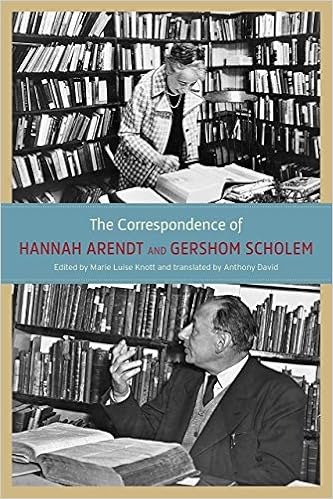
Inevitably, being Jewish was the central fact of their lives, and they devoted much of their careers to wrestling with the historical and political meaning of Jewishness. . The cover of The Correspondence of Hannah Arendt and Gershom Scholem, newly published in English (edited by Marie Luise Knott and translated from German by Anthony David), underscores these similarities with a visual rhyme. Arendt and Scholem are each portrayed, in separate photographs, in the act of consulting a giant tome against a background of crowded bookshelves—emblems of lives spent reading, writing, and thinking. Yet as these letters show, it was the very things that Arendt and Scholem had in common that turned out to be responsible for the ultimate rupture of their friendship.”
Now that the full correspondence of Hannah Arendt and Gershom Scholem has finally been published, we can begin to understand the contours and dynamics of a relationship that was always complex. These letters illuminate the historical record by placing into context and documenting not only the profound differences between these powerful personalities but also their commonalities, shared activities, interests, and loyalties
The lives of Hannah Arendt and Gershom Scholem were variations on the same fate. Two of the greatest thinkers of the 20th century… Both would end up fleeing the collapse of German Jewry and remaking their lives abroad—Scholem in Palestine, where he emigrated in 1923, and Arendt in France, where she escaped from Hitler in 1933, and then in the United States….
But what was the future of the Jews after the Holocaust? More particularly, where was this future—in Israel or the diaspora? This was the central question that divided Arendt and Scholem, whose attitudes toward Zionism were both complex, but finally very different. …
She believed that the life of the Jews, like her own Jewish life, was properly international, with deep roots in Europe and America. The evolution of Zionism, under the pressure of war and Holocaust, toward a more assertive claim on Jewish statehood left her alienated. …
This difference between Arendt and Scholem emerged into the open in 1946, after Arendt published an article titled “Zionism Reconsidered” in the "Menorah Journal"…. In this piece, Arendt offered a biting critique of what she called “the tragic abdication of political leadership by the vanguard of the Jewish people”—that is, the Jews of Palestine.... The quest for a Jewish state could only end in permanent hostility between Jews and Arabs; and because a Jewish state could not survive without the protection of a great power, Jews would end up in the very position of dependency that Zionism was meant to cure…. Arendt’s analysis of what went wrong with Zionism began at the very beginning, with Theodor Herzl”….
It was the publication, in 1963, of Arendt’s "Eichmann in Jerusalem" that finally brought the curtain down on the correspondence, and on the friendship. Scholem’s hostile reaction to the book, and Arendt’s indignant, disappointed response, were a replay of the exchange over “Zionism Reconsidered” 17 years earlier….
Half a century later, Scholem and Arendt offer an exceptionally clear illustration of the clash between particularism and universalism, which remains one of the major issues in Jewish life.
No comments:
Post a Comment